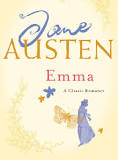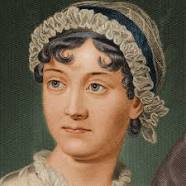Emma Page #29
Emma, by Jane Austen, is a novel about youthful hubris and the perils of misconstrued romance. The story takes place in the fictional village of Highbury and the surrounding estates of Hartfield, Randalls, and Donwell Abbey and involves the relationships among individuals in those locations consisting of "3 or 4 families in a country village". The novel was first published in December 1815 while the author was alive, with its title page listing a publication date of 1816. As in her other novels, Austen explores the concerns and difficulties of genteel women living in Georgian–Regency England; she also creates a lively comedy of manners among her characters and depicts issues of marriage, gender, age, and social status.
Soon afterwards Mr. Elton quitted them, and she could not but do him the justice of feeling that there was a great deal of sentiment in his manner of naming Harriet at parting; in the tone of his voice while assuring her that he should call at Mrs. Goddard's for news of her fair friend, the last thing before he prepared for the happiness of meeting her again, when he hoped to be able to give a better report; and he sighed and smiled himself off in a way that left the balance of approbation much in his favour. After a few minutes of entire silence between them, John Knightley began with-- “I never in my life saw a man more intent on being agreeable than Mr. Elton. It is downright labour to him where ladies are concerned. With men he can be rational and unaffected, but when he has ladies to please, every feature works.” “Mr. Elton's manners are not perfect,” replied Emma; “but where there is a wish to please, one ought to overlook, and one does overlook a great deal. Where a man does his best with only moderate powers, he will have the advantage over negligent superiority. There is such perfect good-temper and good-will in Mr. Elton as one cannot but value.” “Yes,” said Mr. John Knightley presently, with some slyness, “he seems to have a great deal of good-will towards you.” “Me!” she replied with a smile of astonishment, “are you imagining me to be Mr. Elton's object?” “Such an imagination has crossed me, I own, Emma; and if it never occurred to you before, you may as well take it into consideration now.” “Mr. Elton in love with me!--What an idea!” “I do not say it is so; but you will do well to consider whether it is so or not, and to regulate your behaviour accordingly. I think your manners to him encouraging. I speak as a friend, Emma. You had better look about you, and ascertain what you do, and what you mean to do.” “I thank you; but I assure you you are quite mistaken. Mr. Elton and I are very good friends, and nothing more;” and she walked on, amusing herself in the consideration of the blunders which often arise from a partial knowledge of circumstances, of the mistakes which people of high pretensions to judgment are for ever falling into; and not very well pleased with her brother for imagining her blind and ignorant, and in want of counsel. He said no more. Mr. Woodhouse had so completely made up his mind to the visit, that in spite of the increasing coldness, he seemed to have no idea of shrinking from it, and set forward at last most punctually with his eldest daughter in his own carriage, with less apparent consciousness of the weather than either of the others; too full of the wonder of his own going, and the pleasure it was to afford at Randalls to see that it was cold, and too well wrapt up to feel it. The cold, however, was severe; and by the time the second carriage was in motion, a few flakes of snow were finding their way down, and the sky had the appearance of being so overcharged as to want only a milder air to produce a very white world in a very short time. Emma soon saw that her companion was not in the happiest humour. The preparing and the going abroad in such weather, with the sacrifice of his children after dinner, were evils, were disagreeables at least, which Mr. John Knightley did not by any means like; he anticipated nothing in the visit that could be at all worth the purchase; and the whole of their drive to the vicarage was spent by him in expressing his discontent. “A man,” said he, “must have a very good opinion of himself when he asks people to leave their own fireside, and encounter such a day as this, for the sake of coming to see him. He must think himself a most agreeable fellow; I could not do such a thing. It is the greatest absurdity--Actually snowing at this moment!--The folly of not allowing people to be comfortable at home--and the folly of people's not staying comfortably at home when they can! If we were obliged to go out such an evening as this, by any call of duty or business, what a hardship we should deem it;--and here are we, probably with rather thinner clothing than usual, setting forward voluntarily, without excuse, in defiance of the voice of nature, which tells man, in every thing given to his view or his feelings, to stay at home himself, and keep all under shelter that he can;--here are we setting forward to spend five dull hours in another man's house, with nothing to say or to hear that was not said and heard yesterday, and may not be said and heard again to-morrow. Going in dismal weather, to return probably in worse;--four horses and four servants taken out for nothing but to convey five idle, shivering creatures into colder rooms and worse company than they might have had at home.” Emma did not find herself equal to give the pleased assent, which no doubt he was in the habit of receiving, to emulate the “Very true, my love,” which must have been usually administered by his travelling companion; but she had resolution enough to refrain from making any answer at all. She could not be complying, she dreaded being quarrelsome; her heroism reached only to silence. She allowed him to talk, and arranged the glasses, and wrapped herself up, without opening her lips. They arrived, the carriage turned, the step was let down, and Mr. Elton, spruce, black, and smiling, was with them instantly. Emma thought with pleasure of some change of subject. Mr. Elton was all obligation and cheerfulness; he was so very cheerful in his civilities indeed, that she began to think he must have received a different account of Harriet from what had reached her. She had sent while dressing, and the answer had been, “Much the same--not better.” “My report from Mrs. Goddard's,” said she presently, “was not so pleasant as I had hoped--'Not better' was my answer.” His face lengthened immediately; and his voice was the voice of sentiment as he answered. “Oh! no--I am grieved to find--I was on the point of telling you that when I called at Mrs. Goddard's door, which I did the very last thing before I returned to dress, I was told that Miss Smith was not better, by no means better, rather worse. Very much grieved and concerned--I had flattered myself that she must be better after such a cordial as I knew had been given her in the morning.” Emma smiled and answered--“My visit was of use to the nervous part of her complaint, I hope; but not even I can charm away a sore throat; it is a most severe cold indeed. Mr. Perry has been with her, as you probably heard.”
Translation
Translate and read this book in other languages:
Select another language:
- - Select -
- 简体中文 (Chinese - Simplified)
- 繁體中文 (Chinese - Traditional)
- Español (Spanish)
- Esperanto (Esperanto)
- 日本語 (Japanese)
- Português (Portuguese)
- Deutsch (German)
- العربية (Arabic)
- Français (French)
- Русский (Russian)
- ಕನ್ನಡ (Kannada)
- 한국어 (Korean)
- עברית (Hebrew)
- Gaeilge (Irish)
- Українська (Ukrainian)
- اردو (Urdu)
- Magyar (Hungarian)
- मानक हिन्दी (Hindi)
- Indonesia (Indonesian)
- Italiano (Italian)
- தமிழ் (Tamil)
- Türkçe (Turkish)
- తెలుగు (Telugu)
- ภาษาไทย (Thai)
- Tiếng Việt (Vietnamese)
- Čeština (Czech)
- Polski (Polish)
- Bahasa Indonesia (Indonesian)
- Românește (Romanian)
- Nederlands (Dutch)
- Ελληνικά (Greek)
- Latinum (Latin)
- Svenska (Swedish)
- Dansk (Danish)
- Suomi (Finnish)
- فارسی (Persian)
- ייִדיש (Yiddish)
- հայերեն (Armenian)
- Norsk (Norwegian)
- English (English)
Citation
Use the citation below to add this book to your bibliography:
Style:MLAChicagoAPA
"Emma Books." Literature.com. STANDS4 LLC, 2025. Web. 9 Jan. 2025. <https://www.literature.com/book/emma_29>.




Discuss this Emma book with the community:
Report Comment
We're doing our best to make sure our content is useful, accurate and safe.
If by any chance you spot an inappropriate comment while navigating through our website please use this form to let us know, and we'll take care of it shortly.
Attachment
You need to be logged in to favorite.
Log In